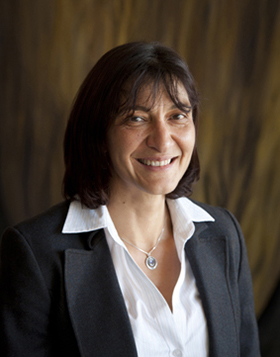Passionate maths and chemistry teachers inspire Australia's top female scientist and Laureate Fellow
Media releaseAustralia could have been denied a top female scientist and a Laureate Fellow, and Deakin University a leading researcher, and passionate advocate for science teaching if Professor Maria Forsyth had stuck with the career path deemed suitable for young Greek girls at the time.
"I was not really expected to go to university, nor was I expected to necessarily finish high school," she laughed.
"My parents come from a small village in Greece and they do understand the value of education but there have been times when I have had to defend my choices to my parents."
Professor Forsyth, from the University's Institute for Frontier Materials loved maths and science at Year 9, but freely admits she could have gone either way in a career as she also enjoyed history and geography. She originally planned to be a teacher.
"I think it was the teachers who inspired me," she said.
"I had fantastic chemistry and maths teachers who were really bright and passionate about the students and what they were doing, but even at that time there was a physics teacher who was teaching out of field so we taught ourselves.
"Seriously, there were some really bright boys in my VCE class who taught us physics.
"Now it's even more of a problem."
Professor Forsyth said the issue with teachers teaching out of field is that science knowledge is needed to relate what the students are learning in class to real world problems and by doing so creating excitement about what the students are learning.
"It becomes formulaic almost," she said. "You must learn this, this and this to pass an exam.
"At kindergarten, when I was helping in my son's class, I saw the kids creatively building things and solving problems in the playground yet you get them to uni, especially in the early years, it's been knocked out of them and they want to know what formula they need to pass the exam.
"So at what point do we go from that ability to solve problems in a creative way to give me a formula so I can pass an exam?"
Professor Forsyth said when she was approached by Professor Tytler and Associate Professor Hubber about the project she thought it was a great way to make a difference to the way teachers taught science and as a result reach more students.
"The Institute has its own outreach program, as does the CSIRO and Questacon – The National Science and Technology Centre, for handfuls of kids every year but what we need to do is get the teachers enthusiastic and see the relevance of what they are teaching to the real world and then that will feed on itself."
One challenge Professor Forsyth is keen to see tackled is the lack of girls doing science and maths.
"For some reason we are not exciting the girls," she said.
"During a recent visit to a science centre I said to the guys I'm not surprised you are not exciting the girls here, its all about building things and that wouldn't excite me either.
"I think we need to talk about clean energy, or biomedical technology, maybe something that girls can relate to more than building a bridge or building something that will fly."
Professor Forsyth said communicating the passion of science was critical, a skill which she was developing closer to home with the Institute's own PhD students who will be intimately involved in the Reconceptualising Mathematics and Science Teacher Education Programs project.
"We are making communication a vital skill for our PhD students," Professor Forsyth said.
"The idea is to get our PhD students to present and talk about their research in a way lay people can understand and have some of those students link up with the education students to develop a package which can go out to schools, perhaps it might be something from the energy sector that can be linked into VCE chemistry. I think this approach will make chemistry more real and stimulating for the students"
Share this story
 Professor Maria Forsyth
Professor Maria Forsyth
